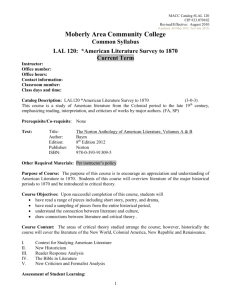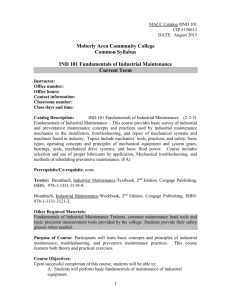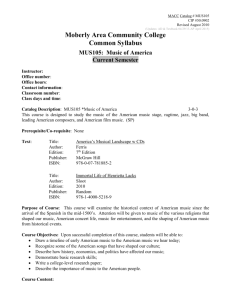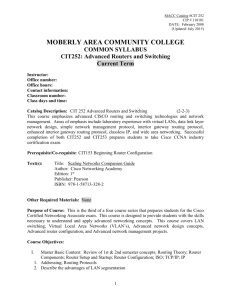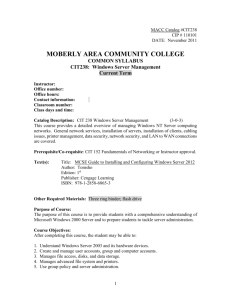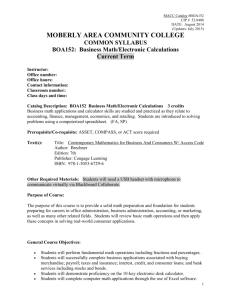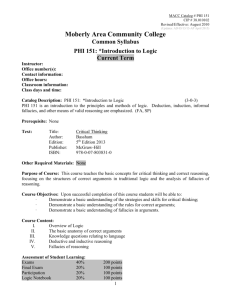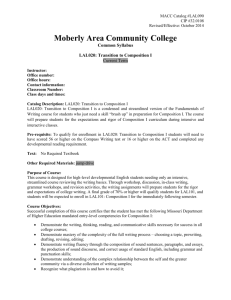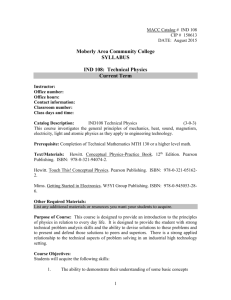CIT 201 Relational Database Systems
advertisement
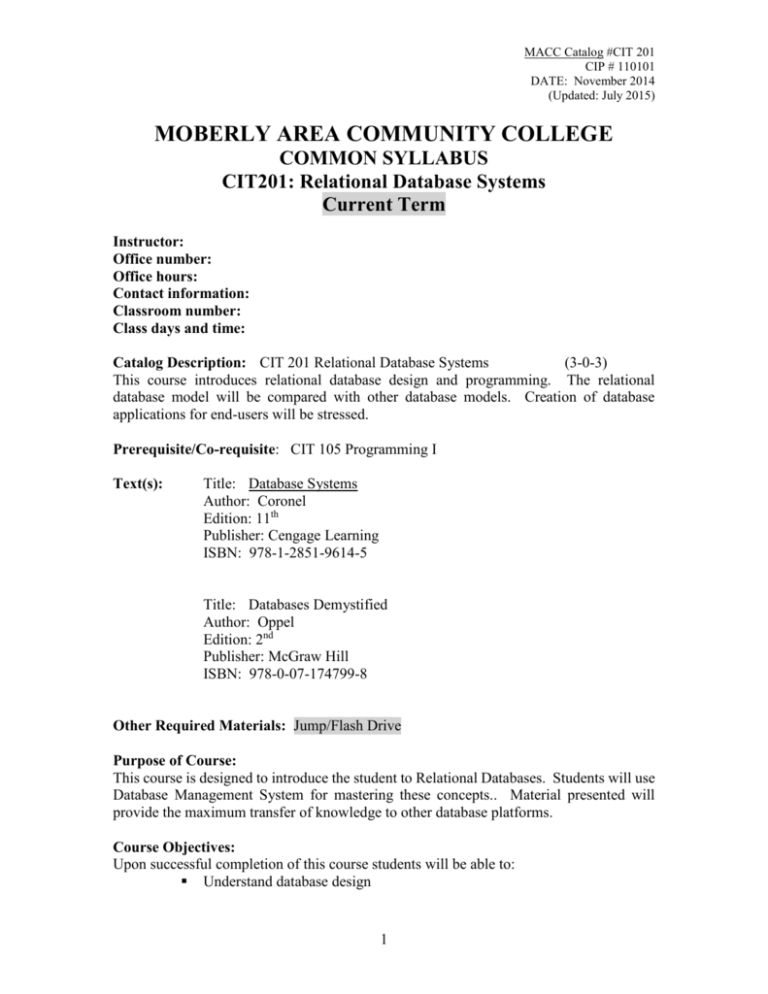
MACC Catalog #CIT 201 CIP # 110101 DATE: November 2014 (Updated: July 2015) MOBERLY AREA COMMUNITY COLLEGE COMMON SYLLABUS CIT201: Relational Database Systems Current Term Instructor: Office number: Office hours: Contact information: Classroom number: Class days and time: Catalog Description: CIT 201 Relational Database Systems (3-0-3) This course introduces relational database design and programming. The relational database model will be compared with other database models. Creation of database applications for end-users will be stressed. Prerequisite/Co-requisite: CIT 105 Programming I Text(s): Title: Database Systems Author: Coronel Edition: 11th Publisher: Cengage Learning ISBN: 978-1-2851-9614-5 Title: Databases Demystified Author: Oppel Edition: 2nd Publisher: McGraw Hill ISBN: 978-0-07-174799-8 Other Required Materials: Jump/Flash Drive Purpose of Course: This course is designed to introduce the student to Relational Databases. Students will use Database Management System for mastering these concepts.. Material presented will provide the maximum transfer of knowledge to other database platforms. Course Objectives: Upon successful completion of this course students will be able to: Understand database design 1 MACC Catalog #CIT 201 CIP # 110101 DATE: November 2014 (Updated: July 2015) Normalize data Create Tables; Update, View and Delete data Use SQL and MySQL Connect to a database using the Web Write Useful Queries using SQL/PHP Demonstrate good programming style and conventions Course Content: 1. Introduction to Database Management 2. The Relational Model, Introduction, QBE, and Relational Algebra 3. SQL 4. Advanced Topics 5. Normalization 6. Database Methodology 7. DBMS Functions 8. Database Administration 9. Database Management Statement to Connect Course with Technical Program Outcome Statement: In compliance with MACC’s General Education outcomes, the student who successfully completes this course will be able to: I. Demonstrate effective written and oral communication; Assessment of Student Learning: Grading: Grades are determined on the basis of examination scores and written homework assignments and class participation. Counseling with the student when the need arises to evaluate his/her efforts and/or weaknesses also plays a part in grading. The grading scale is: A = 90%, B = 80%, C = 70%, D = 60%. Approximately three exams will be given during the semester. Each exam will be worth 200 points. A final worth 300 points will also be given. All exams will be announced well in advance. Exams will have written components and may have online components. These exams will account for 50% of the course grade. Forty percent of the course grade will come from three to four projects. Each of these projects will be worth 25 to 50 points. All programs must be turned in on the due date. An incomplete program must be turned in as is on the due date. The program may be completed later and turned in with the permission of the instructor. Programs that are late (with permission) will receive reduced credit. Ten percent of the course grade will come from collected homework assignments and class participation. These assignments will range from summaries of assigned reading, to simple programming problems, to entering class lecture programming examples and making them work. Instructor Policies: 2 MACC Catalog #CIT 201 CIP # 110101 DATE: November 2014 (Updated: July 2015) Academic Dishonesty: MACC board policy is as follows: “Academic dishonesty by students damages institutional credibility and unfairly jeopardizes honest students; therefore, it will not be tolerated in any form.” Forms of academic dishonesty include but are not limited to the following: violations of copyright law, plagiarism, fabrication, cheating, collusion, and other academic misconduct. Incidents of dishonesty regarding assignments, examinations, classroom/laboratory activities, and/or the submission of misleading or false information to the College will be treated seriously. The procedure for handling academic dishonesty is outlined in the Student Handbook (Policy Handbook M.010). In cases of alleged academic dishonesty, the burden of proof is on the student, not on the instructor. Attendance: Any student who misses two consecutive weeks of class during a regular sixteen-week semester or the equivalent proportion of class time during a shorter session will be dropped from the class by the instructor unless acceptable justification is supplied. Additionally, any student who misses more than one-fourth of the entire number of in-seat class meetings in a regular 16-week semester or the equivalent proportion of class time during a shorter session, may be dropped from that class by the instructor if, in the opinion of the instructor, the student does not have reasonable opportunity to succeed in the class. A student’s attendance rate will be calculated based upon the first day of the semester (not the student’s date of enrollment in the course). Student attendance must be defined in a different manner for online, hybrid, and virtual courses. Student attendance in these courses is defined as active participation in the course. Online, hybrid, and virtual courses will, at a minimum, have weekly mechanisms for student participation, such as any or all of the following methods: a. Completion of quizzes or exams b. Submission of assignments c. Participation in threaded discussions d. Communication with the instructor A student who does not participate in an online, hybrid, or virtual course for two consecutive weeks will be dropped by the instructor unless acceptable justification is supplied. As with ground courses, a student’s attendance rate in online courses will also be calculated based upon the first day of the semester. If a student does not demonstrate active participation in the online course within the first two weeks (or the equivalent proportion of class time during a short session), the student will be dropped as “never attended.” Simply logging into an online class does not constitute active participation. Students should be aware that their dropping a course and their last date of attendance in the course may impact their financial aid. Tardiness: per instructor’s policy 3 MACC Catalog #CIT 201 CIP # 110101 DATE: November 2014 (Updated: July 2015) Make-up and late work: per instructor’s policy Extra-Credit: per instructor’s policy Schedule of Student Assignment and Activities: (per instructor) ADA Statement Students who have disabilities that qualify under the Americans with Disabilities Act may register for assistance through the Office of Access and ADA Services. Students are invited to contact the Access Office to confidentially discuss disability information, academic accommodations, appropriate documentation and procedures. For more information, please call either the Moberly office at (660) 263-4100 x 11240 or the Columbia office at (573) 234-1067 x 12120, or visit our web page at http://www.macc.edu/index.php/services/access-office. Title IX Statement MACC maintains a strict policy prohibiting sexual misconduct in any form, including sexual harassment, sexual discrimination, and sexual violence. All MACC employees, including faculty members, are considered mandated reporters of sexual misconduct and as such are expected to contact the Title IX Coordinator when they become aware, in conversation or in writing, of an incident of sexual misconduct. For more information on this policy or to learn about support resources, please see http://www.macc.edu/sexualmisconduct-policy or contact Dr. Jackie Fischer, MACC’s Title IX Coordinator, at 660263-4110, ext. 11236 or jackief@macc.edu. 4



